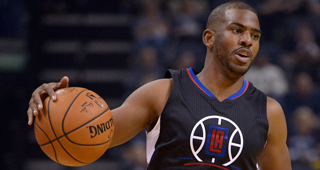This season, Chris Paul balanced his commitments with the Los Angeles Clippers and as president of the National Basketball Players Association. The NBA and NBPA agreed upon a new CBA without any public issues.
“With all of the stuff on his plate, I really didn’t have much of an expectation that he was going to be able to be available,” Michele Roberts recently told The Vertical. “I would say, ‘Guys, give me an hour and I promise I won’t bug you for a week.’ And his thing was, ‘No. Don’t worry about that, Michele. You just tell us what you need from us and we’ll be there.’ Chris was just remarkably available. It would have been perfectly within his rights to say, ‘Look, I ain’t getting paid for this. Let’s keep it to a minimum.’ But he was always there when I needed him. If I said it was critical that I reach you today, it was done.”
Roberts tried to avoid calling him during his morning drives to drop off his kids at school while Adam Silver was mindful not to plan negotiations for when Paul had games. Steve Ballmer gave Paul the freedom to go wherever he was needed.
Paul tried to keep those moments to a minimum but recalls a wild 24-hour period in which he played a preseason game in Sacramento, immediately caught a private, red-eye flight to New York for a critical meeting between players and owners and then returned to Los Angeles.
“[Paul’s] unique,” James Jones told The Vertical. “The rare breed of guy that can focus and perform on the highest level, on and off the court. We all know how seriously he takes his craft, but he takes the job of union president and looking out for the welfare of the game and players just as serious. There were a lot of late nights, late flights, phone calls, just extra energy, and then just going out there and playing 38 minutes a night, I mean, as if nothing happens. It’s a testament to his character and his integrity. Because he knew when he signed up for it that he’d be juggling heavy weights on both sides. But we got a deal done and that’s largely a byproduct of his leadership.”
Paul sat in on the talks in 2011, which were contentious.
“It wasn’t so much about the pressure. Me and [Jones] talked about it a lot, even when we went into the negotiations, that we just felt a lot better because we understood what the players wanted,” Paul told The Vertical. “It’s like when you study for a test. If you’re unprepared when you go in there, you’re like, ‘Oh my goodness.’ But we were prepared. The biggest thing is, when we went in for the last negotiations, we didn’t say much. We talked here and there, but we didn’t really know what to say or how to look across at those owners and really talk. This time, we were comfortable. We were very comfortable.”
The executive committee now has players representing a cross section of the league, but Roberts wouldn’t deny the influence of having Paul, LeBron James, Carmelo Anthony and Stephen Curry involved in the process.
“That’s not to say the non-marquee guy doesn’t make contributions. That’s nonsense. Of course, they do,” Roberts told The Vertical. “[Mutombo] said, ‘Everybody listens to the marquee players. The players do, the fans do, and the owners do.’ They think, if these guys who are making so much money and have so much made, if it’s important enough for them to commit their time and attention to the [players association], then it must be important, and that’s the logic behind having marquee guys not symbolically engaged. … At some point, Chris is going to break my heart and announce that he’s going to leave the executive committee.”
Paul told The Vertical that he “couldn’t imagine” working through this last round of negotiations with anyone but Roberts. His commitment proved to be worthwhile.
“It’s almost like a service position,” Paul told The Vertical. “It’s phone calls, it’s meetings, on top of tackling our own different things. A lot of times, people hear CBA and they think [basketball-related income] numbers and they think all of those type of things, but there are different things, even as far as the tights guys wear, the socks, that’s on a game-to-game basis, where we have to have these conversations and talk about what the fans may not notice.
“Obviously, we’re players in this league, but it’s about making sure the game continues to go on. It’s a great feeling. I feel like we’ve done our responsibilities.”


